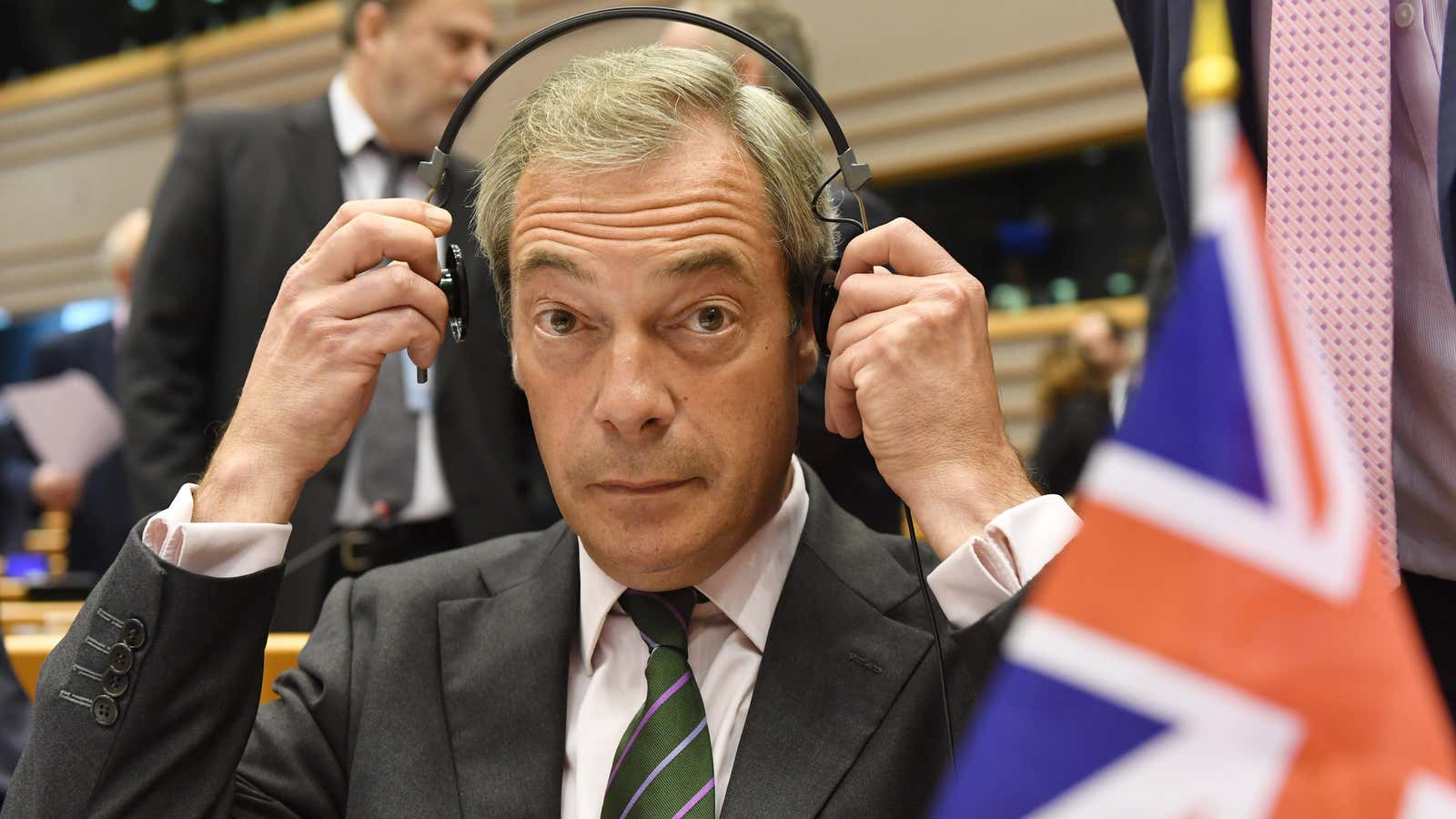As dawn broke on June 24, 2016, UK politician Nigel Farage was celebrating the triumph of a dangerous narrative. Farage, who until yesterday headed the UK Independence Party, declared the vote in favor of Britain leaving the European Union a victory for ordinary people. “We will get our country back, we will get our independence back and we will get our borders back,” he promised.
An hour later, Farage proved that facts and the Brexit vote were not one and the same. The Leave campaign had for instance promised to take the £350 million a week that the UK sent to the EU and spend it instead on National Health Services, going so far as to emblazon this vow on the side of a campaign bus. Confronted with this promise, Farage declared it had been a “mistake” and that he could not guarantee the funds would be redirected to the health fund.
He did not appear to feel any discomfort about back-pedaling. After all, in the age of the post-factual democracy, politicians sometimes get what they want by getting the narrative right and the facts wrong.
Politics in the age of virality
Stories have power. And today, in the US as well as the UK, the narratives that resonate often seem to involve rebellion against the political establishment and a desire to regain independence by reaffirming national borders.
Because these narratives typically involve a selective use of facts and lenient dealings with matters of truth, they have given rise to symptoms of a post-factual democracy. A democracy is in a post-factual state when truth and evidence are replaced by robust narratives, opportune political agendas, and impracticable political promises to maximize voter support.
Certain stories have a tendency to catch on more than others and go viral, as professor of marketing Jonah Berger at the University of Pennsylvania’s Wharton School has demonstrated. Stories feeding on awe, anger, or fear often enjoy more social transmission than stories with sad or depressing content. Meanwhile, stories correcting, explaining or adjusting facts, fictions and forecasts have a hard time getting traction on social media. What goes viral is not necessarily true, and whatever is true doesn’t necessarily get a viral life.
This theory played out during the Brexit campaign and is still going on with respect to the presumptive US Republican presidential nominee Donald Trump, whose often-loose relationship with the truth has come at little cost to his popularity. In just one of many examples, after setting foot on Scottish soil on the 24th, he tweeted the following:
Just arrived in Scotland. Place is going wild over the vote. They took their country back, just like we will take America back. No games!
— Donald J. Trump (@realDonaldTrump) June 24, 2016
Twitter was kind enough to remind Trump in numerous tweets and comments that the Scottish vote was 62% to 38% in favor of staying within the European Union. Nonetheless, Trump gave an interview on the golf course in which he said he understood the Leave voters: “They’re angry over borders, they’re angry over people coming into the country and taking over, nobody even knows who they are. They’re angry about many, many things.”
Of course Trump embraced the Leave vote enthusiastically. He seems to recognize the Brexit narrative as a variation of the same story he has used to win over people who feel marginalized in the US.
Today, savvy politicians are harnessing the anger and fear that certain demographics feel over economic woes and immigration, and channeling those emotions into a narrative that argues stronger borders will solve most any problem. For the purposes of a political campaign, it doesn’t necessarily matter if these narratives are true. An appealing story may get likes and upvotes on social media regardless, and the social validation of a given narrative can be turned into votes.
But believing something doesn’t make it so—and a lot of people believing the same thing doesn’t make something true either. Just because a certain political point of view or political figure seems to be supported by many, and the social proof of a narrative thus seems strong, shows at best that a lot people apparently support a given cause or person. (Sometimes, apparent supporters are just bots generating misleading social proof of alignment.)
“I win whatever you lose”
The World Economic Forum (WEF) recently announced 10 global challenges that countries around the world need to work together to solve: food security, inclusive growth, employment, climate change, global finance, the internet, gender equality, global trade, long-term investment, and health care. The WEF has also declared misinformation to be among the great challenges of our time: “The global risk of massive digital misinformation sits at the centre of a constellation of technological and geopolitical risks ranging from terrorism to cyberattacks and the failure of global governance.”
Indeed, we are already seeing social media, which relies on emotionally resonant narratives, amplify irrational group behavior. Unjustified Twitter-storms and social-media echo chambers may prop up financial bubbles or lead to market crashes. They can cause political, social, and religious polarization. And social news aggregation sites and other online systems that rely on social proof—upvoting, downvoting, comments, and likes—show that online “democratic” ratings systems can increase the chances that false beliefs spread.
The global challenges listed by the WEF all require systematic and prolonged cooperation and coordination among countries and continents. But post-factual democracy that relies on voter maximization is more like a zero-sum game–I win whatever you lose.
If the United Kingdom or the US attempt to win this way, we may all lose. Try solving grand challenges with post-factual democracy: You might as well just deny the global challenges, and forget about democracy while you are at it. Perhaps that’s part of the reason Farage, having gotten what he said he wanted, almost instantly gave up.
